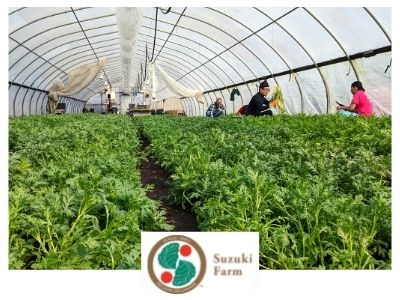Delmar’s Suzuki Farm Entering Next Level of Japanese Produce Business With Purchase by Food’s Style USA

October 12, 2021 –
Fresh, local produce is a point of pride for the Delmarva Peninsula, which is known for corn, tomatoes, watermelons, lima beans and soybeans. Large farms supply ingredients for poultry feed, while boutique growers deliver to restaurants and frequent farm markets.
But one Delmar-area farm has quietly cornered a niche market — not only in Delaware but also along the East Coast. Suzuki Farms is the rare grower of Japanese herbs, vegetables and citrus.
Japanese Produce Business a Labor of Love
For decades, the produce business has been a labor of love for Ken Suzuki, who was born in Gamagori, Aichi Prefecture, Japan. To take the business to the next level, he turned to Seattle-based Food’s Style USA Inc., which acquired the farm in February 2021. The new owner has hit the ground running.
“We are planning to build a new packing facility and greenhouses to grow more produce and maintain better quality,” says Takahiro Igo, vice president of Food’s Style.
As a result, Delaware may become just as famous for shiso and shishito peppers as it is for chickens.
Spotting a Need
Suzuki, a trained chick sexer, and wife Kumiko came to the United States in 1974 to work for Perdue Farms. Unable to find high-quality, affordable Japanese produce, he began growing his own on a small farm. The hobby wasn’t a stretch: Suzuki had attended an agricultural high school in Japan.
Even so, it wasn’t easy. The fledgling farmer quickly learned that rabbits like edamame, and although the area weather is similar to that in the Miyagi prefecture, Mid-Atlantic cold snaps can wipe out a crop. But Suzuki persisted and, after 20 years in Parsonsburg, Maryland, moved to a Delmar, Delaware, farm.
After Perdue changed its chick sexing methods, Suzuki turned his pastime into a business. However, specializing in Japanese produce requires meticulous attention to detail. For discerning restaurateurs and wholesalers, each yuzu, daikon radish or mustard green must be as beautiful as it is tasty.
 Among the 30-plus crops are Japanese radish, Napa cabbage, edamame, eggplant and peppers. The bestseller is Tokyo scallion, which is thicker and sweeter than conventional supermarket scallions. Suzuki Farms also sells to individuals, who can order online.
Among the 30-plus crops are Japanese radish, Napa cabbage, edamame, eggplant and peppers. The bestseller is Tokyo scallion, which is thicker and sweeter than conventional supermarket scallions. Suzuki Farms also sells to individuals, who can order online.
The Perfect Match
In his 70s, Suzuki was looking for the next generation of ownership for his farm. Meanwhile, Food’s Style sought to diversify. Like the entire hospitality industry, the company’s Hokkaido Ramen Santouka restaurants in Washington, Massachusetts and Virginia were hit by the COVID-19 pandemic.
“We were looking for an opportunity to either take over a business or start a farm of our own,” Igo explains. “‘Stay home’ made people more curious about food safety.”
Mutual contacts put Food’s Style and Suzuki Farm in touch. “We learned that he is popular and famous on the East Coast,” Igo says. “He has been doing business for a long time.”
The founder is staying on to help train employees in the proper techniques. Since the farm is now at production capacity, Food’s Style will be working to increase the output. That means more machinery, more greenhouses and a new packing facility.
It also means cultivating more land. The farm currently has about 35 cultivated acres, and there is room for more fields. Nevertheless, Igo envisions the need for additional acres — hopefully in Delaware.
“Delaware’s state and county agencies,” he notes, “are very friendly to communicate with and very helpful to the small local businesses.”
Newsletter Sign Up
Stay Up To Date With Delaware